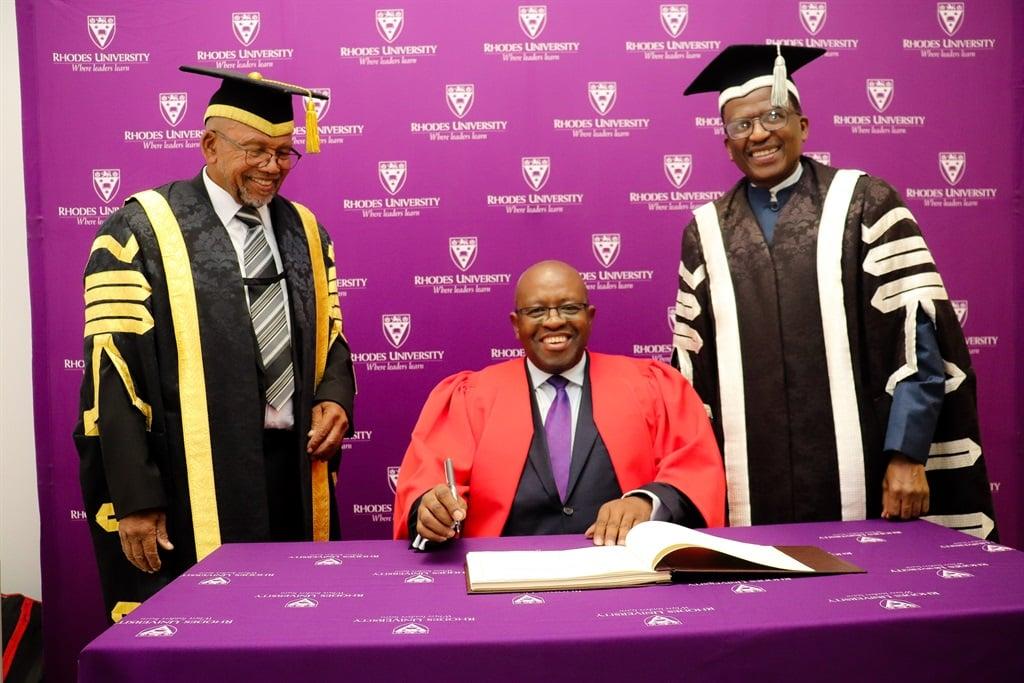
Africa-Press – South-Africa. Constitutional Court Justice Mbuyiseli Madlanga says the judiciary isn’t free from blame for the horrifyingly high figures of gender-based violence (GBV) in South Africa.
He said judges sometimes didn’t handle cases of GBV the way they should. Madlanga was speaking after being conferred with a Doctor of Laws (LLD) (honoris causa) degree by Rhodes University in Makhanda on Thursday.
Speaking on the theme “Gender-Based Violence, is there anything we can do?”, Madlanga revealed that 988 women were killed in South Africa between April 2020 and September 2022 by men in acts of domestic violence. He said this was just the tip of the iceberg, as other cases may not be recorded correctly.
The Rhodes University alumnus was honoured at the fourth of six autumn graduation ceremonies at the university this week.
“We, judicial officers, are not free from blame. We do not treat cases of gender-based violence the way we should. Part of the problem is that, being part of the same society that breeds GBV, we are not immune from the ills of patriarchy, sexism and [misogyny] that are among the factors that are at the centre of GBV,” Madlanga added.
He said judges’ experiences and outlooks on life were deeply entwined. He added that it would be naïve to think that just because the country had a Constitution and a Bill of Rights, those experiences would no longer influence decision-making.
He said patriarchy, sexism and misogyny would continue to be ingrained in the thought processes of some, if not most judges.
He added:
According to him, as long as male judges numerically dominate the judiciary, the male perspective will dominate court and jurisprudence. The realities of discrimination would taint the approach of some judges to cases of GBV, he added.
Accepting his degree, Madlanga said: “I am delighted that Rhodes University has decided to honour me. What touches me, even more, is that the honour is being bestowed by my alma mater, an institution of which I am truly proud and speak highly of to whoever cares to listen.”
Rhodes University vice-chancellor Professor Sizwe Mabizela said Madlanga was being honoured for his distinguished judicial career and significant contribution to South Africa’s jurisprudence development.
“During his long leave in the second half of 2018, he offered to lecture free of charge at our province’s two historically disadvantaged universities. I am delighted that the Rhodes University community has seen it fit to honour his many and significant contributions with the award of an honorary doctorate,” said Mabizela.
Madlanga was born and raised in the rural village of Njijini, outside the small town of KwaBhaca (formerly Mount Frere) in the Eastern Cape. He matriculated from Mariazell High School in Matatiele in 1979.
He obtained a B Juris degree at the University of Transkei (now Walter Sisulu University) in 1983 and was awarded the Juta Prize for being the best law student at this time. Madlanga enrolled for his LLB degree at Rhodes University and tutored first-year law students in his final year.
At age 34, he was appointed as a judge of the Eastern Cape High Court in Mthatha, becoming South Africa’s youngest judge at the time. Within three years of this appointment, he was appointed Acting Judge of Appeal at the Supreme Court of Appeal in Bloemfontein.
He was then appointed permanently as a Judge of Appeal at the Competition Appeal Court. He continued acting at the Supreme Court of Appeal, but the acting stint, which was to have been for a year, was cut short because he was appointed to act as Judge President of the High Court in Mthatha.
While holding that position, he received yet another appointment as an Acting Justice of the Constitutional Court. He was appointed as a justice of the Constitutional Court in 2013.
For More News And Analysis About South-Africa Follow Africa-Press





